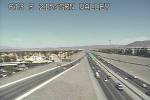Henderson’s latest crimefighting tool raises civil rights concerns
After receiving a $160,000 grant from the U.S. Department of Justice, the Henderson Police Department outfitted nine Chevrolet Tahoe patrol vehicles in May with an Automated License Plate Recognition system to reduce crime and locate criminals. But not everyone is applauding the new software.
Maggie McLetchie, the legal director of the American Civil Liberties Union of Nevada, expressed concerns that the system potentially could invade the privacy of law-abiding residents.
"I understand the desire to want to be more efficient when it comes to catching criminals," McLetchie said. "But that desire shouldn't trump civil liberties."
The system features four cameras on the car that face different directions. The cameras automatically take photos of license plates and run them through databases such as the National Crime Information Center. The officer is alerted if any plate numbers come up stolen.
The officer then double-checks the alert to verify that the plate is in fact stolen and proceeds to apprehend subjects.
Henderson had its first success with ALPR on June 14 when Graham I. Miller was arrested on Boulder Highway on a charge of possession of a stolen vehicle.
During the course of a day, each car equipped with the system can take more than 2,000 photos of license plates , which are stored in a computer system for five years.
"We looked around the country and saw that five years was best practice (for storing data)," said Keith Paul, public information officer with the Henderson Police Department. "Since we just started, we will determine if five years is too long or not long enough."
McLetchie said the problem isn't necessarily the information the system collects on the criminal but the information it retains on everyone else . She is concerned that the system could reveal the whereabouts and other data of residents who have not committed crimes .
"They are able to track where people are going and store that information in the system," McLetchie said. "The system reveals if you went to an abortion clinic or to see an HIV technician. We are talking about a database where the information of where your license plate has been is being stored. Who says that information can't be hacked or improperly used?"
The ACLU sent a letter to the Henderson City Council on Jan. 4 to oppose the ALPR, which was being discussed on the consent agenda that night.
In the letter, McLetchie wrote: "The information from ALPRs can be used to track the location and path of a vehicle, providing whomever can access the data with far more information than whether a driver might be involved in a crime."
The item was approved 5-0, allowing Henderson Police to purchase the system from PIPS Technology.
According to Giles Tipsword, a regional sales manager for PIPS Technology, the system was designed to reduce crime and help locate criminals. The system has been used to locate stolen cars and aid in Amber Alerts.
Tipsword said the company has more than 500 law enforcement agencies contracted out nationwide using ALPRs and more than 20,000 cameras operating globally.
The ACLU still wants to meet with city officials to discuss the system and talk about potential safeguards .
"We would like to see restrictions (that would punish someone if the system is improperly used) implemented on a state level," McLetchie said.
Paul said there currently aren't any plans to meet with the ALCU.
"It is something we can address," Paul said. "If they want to sit down with our administration, we would be happy to discuss."
McLetchie said states such as Maine have adopted statutes to limit how long the system can store the data . Maine's limit is 21 days.
"I think 21 days is something fairly reasonable," McLetchie said.
New Hampshire has prohibited the ALPR system.
When the Los Angeles Police Department installed the system, it consulted with the ACLU to go over concerns.
"The concern we have is no one in Henderson has consulted us," McLetchie said.
McLetchie doesn't want to accuse the city of having corrupt practices, but she said other jurisdictions have abused the system.
"In Canada, we had a situation where someone criticized the ALPR software," McLetchie said.
Police used the software to track down the dissident resident and harass him, McLetchie said.
"This isn't Canada," Paul said. "There is no instance of misuse in Henderson."
Even without the ALPR system, McLetchie said there was a 2010 instance in the Metropolitan Police Department in which information was misused.
McLetchie said the case revealed that a former officer turned private investigator allegedly was accessing department files to gain information on residents without their knowledge or permission.
"We have policies that deal with unauthorized use of data," Paul said. "We are not using this to invade people's privacy. We are using it to catch thieves. (Miller) was a convicted felon out on parole in a stolen car. We talked to people in the community, and they are happy we are trying to make the community safer."
McLetchie agrees that it is important to make the community safer, however, not at the expense of invading the right to privacy.
"I think people have a fundamental right to be left alone unless you are doing something wrong," McLetchie said.
Paul said this is the only camera-type system the Henderson Police Department has, but the city announced June 27 that has installed in-car video cameras.
The system constantly records, but only 60 seconds of video is stored at a time unless the system is activated by a trigger. Triggers include when the vehicle's sirens are activated, when the vehicle travels 80 mph or faster or the officer activates it through a wireless microphone or the computer, police said in a statement.
The cameras are mounted on the rear- view mirror and in the back seat.
Once the officer pulls into the police station, the video is automatically downloaded to the city servers. Video files are automatically saved for 90 days unless there is a request to keep them longer. Videos that show an arrest are saved for about three years.
Contact Henderson and Anthem View reporter Michael Lyle at mlyle@viewnews.com or 387-5201.

















